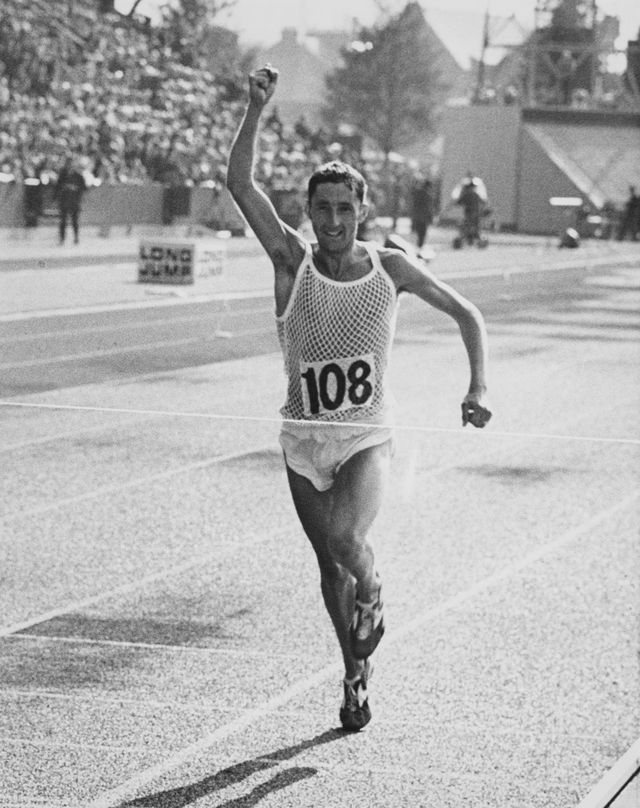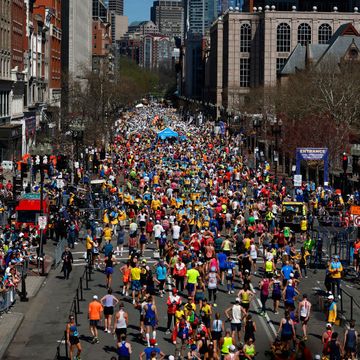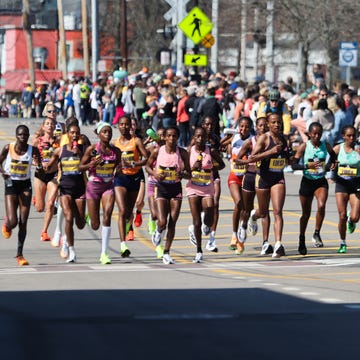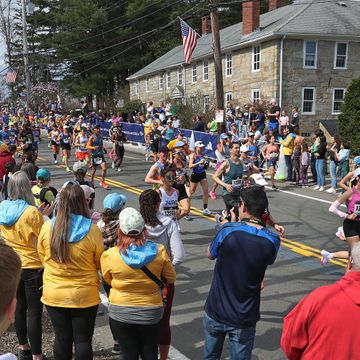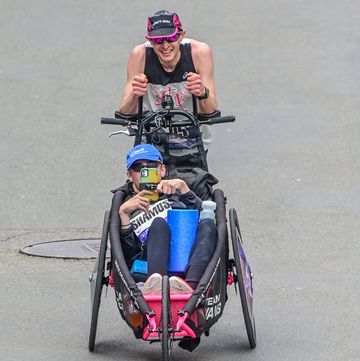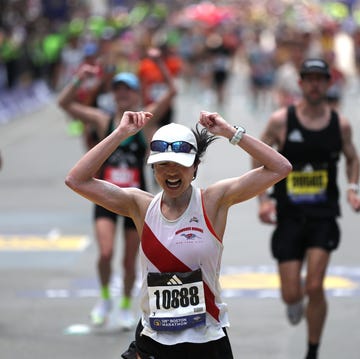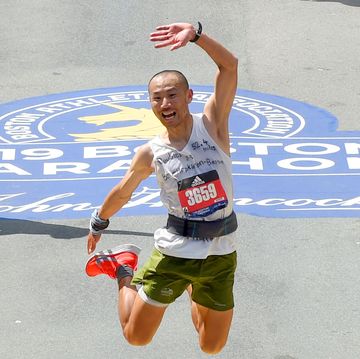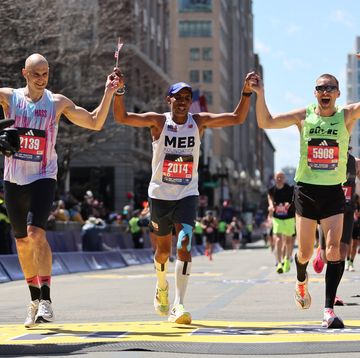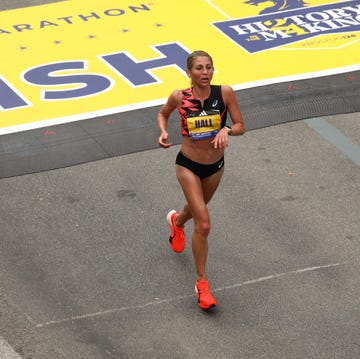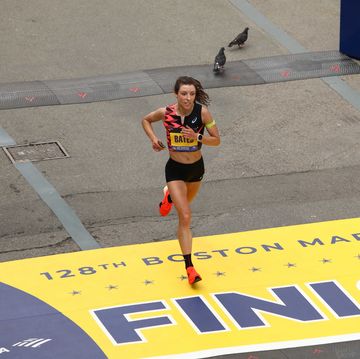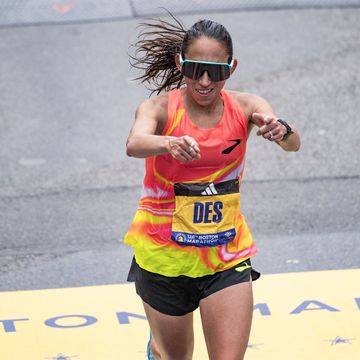Ron Hill, one of the greatest marathon runners of all time, who smashed the Boston Marathon record and also inspired the “streaking” movement by running every day for more than 52 years, died in his home town of Hyde, Cheshire, England, on May 23. He was 82. Three years ago he announced that he was suffering from dementia.
Hill’s standing in elite running history rests on a superlative sequence of races that began in 1968, when he twice set the world track record for 10 miles (46:44.0). In 1969, he won the European marathon championship on the tough Marathon to Athens course. In April 1970, he broke the Boston Marathon record by 3 minutes, running 2:10:30, becoming the first Briton to win that race. Three months later he won the Commonwealth Games marathon in Edinburgh in another huge European, British, and Games record of 2:09:28.
That made him only the second in history to break 2:10, after Australia’s Derek Clayton. Some statisticians dispute the course measurement for Clayton’s Antwerp performance, and list Hill as the world record holder from 1970–74.
Hill also broke the British record for 6 miles, and set world records for 15 miles (1:12:48.2) and 25K (1:15:22.6) on the track. He won British championships at 6 miles, 10 miles, cross-country and the marathon. His top-level marathon victories included Windsor-to-Chiswick, Manchester, Maryland, and two at Enschede, plus second-place finishes at Fukuoka, Harlow, and Windsor-Chiswick. He eventually completed 115 marathons, winning 21, with 21 more on the podium. He ran faster than 2:20 a total of 29 times.
Intensely competitive in every race, and fervently dedicated in his training, Hill hit his peak years in a strictly amateur era when no running-related income was permitted. In Britain, it was also the time when team racing was at its height, so that a committed competitor like Hill might race hard sometimes twice a week, for his club (Bolton United Harriers), University (Manchester), county (Lancashire), or nation (England for cross-country, Great Britain on the track).
In the history of long distance training, he stands close to Paavo Nurmi, Emil Zatopek, Jim Peters, and Arthur Lydiard in having personally tested the limits of quantity and intensity of running that is beneficial, or even possible.
Hill could win from the front, as when he ran alone in the 1970 Commonwealth Games marathon and passed 10K in 29:24 (2:04 marathon pace); or he could win a last-gasp close race, as when he lunged across the line to snatch the English cross-country title for the first time in 1966. And he could win in any conditions, from the heat and hills of Athens to the cold windy rain of Boston in 1970. There he disposed of Fukuoka champion Jerome Drayton at 10 miles, and ran his record time despite having to blow on his fingers to keep some warmth, and, he said, “having no idea of the pace because I didn’t understand the odd splits that Boston used in those days.”
Hill’s greatest disappointment was the 1972 Olympic marathon in Munich, where he started as a co-favorite. His performance was affected by the terrorist massacre, and the postponement of the race by one day disrupted his meticulously scientific prerace schedule of nutrition and other preparation. He placed sixth behind Frank Shorter’s victory.
With a doctorate in textile chemical engineering, and a perfectionist attitude to his running, Hill was an original thinker who applied his scientific mind to the sport he loved. He pioneered many developments that are now in regular use, like synthetic apparel, mesh vests (for ventilation), “freedom shorts,” and reflective strips for safety when running in the dark. He founded Ron Hill Sports, a clothing company that still operates under different ownership, and later Hilly Clothing. He was also the first world-ranked runner to use carbo-loading in marathon preparation, and one of the first to race frequently barefoot in track and cross-country. He even won Britain’s Beverly marathon barefoot (2:26:33), and his plan to race the 1972 Olympic marathon barefoot was thwarted only when parts of the course were resurfaced with new stone pebbles.
He also pioneered a then-unknown race distance named the half-marathon, winning the first ever staged in the U.K., at Freckleton, Lancashire, in 1964. His 64:45 is still the race record. Later, he created the six-day Tour of Tameside event, another new concept, and ran in it for many years.
Born Ronald Hill in the brick manufacturing town of Accrington, at the western edge of the Pennine Hills, his life reflected that cusp between England’s industrial north and the open moors. He always lived close to Manchester but outside its conurbation. His last home in Hyde was only 30 miles south of his birthplace, still near the Pennines. A boy who grew up during wartime and post-war food rationing, Hill showed no sports ability until he discovered in his mid-teens that his small (5-foot-6, 134 pounds) frame was an advantage in running. He became, in his own word, a “fanatic,” and in his systematic way he soon adopted a training regime of 13 sessions a week, expounded in his meticulously detailed two-volume autobiography The Long, Hard Road (1982). He always paid tribute to his wife, May, for helping him bring disciplined stability to his life after they married young in 1960. They had two sons.
As his elite career faded, Hill kept competing but never became a top contender as a master. His focus became his innovative “streak.” He ran every day for at least one mile from December 1964 until January 2017, a total of 52 years, and 39 days, including hobbling on a crutch after bunion surgery. For many admirers, that streak was his supreme achievement. Now a formal organization has oversight of hundreds of “streakers,” and when Hill’s record is eventually broken, it will surely be a media event.
But Hill always sought a new challenge, so in his later years he began to chase the collector’s target of racing in every country. That didn’t happen, but he met his revised goal of gaining finisher’s medals from more than 100 nations, finally racing in Panama and the Faroe Islands. He estimated his lifetime miles at close to 160,000, which is likely to be accurate, given his painstaking recording of each run.
Hill received numerous honors, including the royal recognition of MBE (Member of the British Empire) and the Freedom of Tameside. In May 2018, at age 79, he announced that he had Alzheimer’s but intended to stay active. “Hopefully, this will give other people the impression that dementia is nothing to be frightened by and there shouldn’t be any stigma attached to it,” he said.
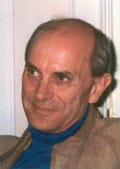
Roger Robinson is a highly-regarded writer and historian and author of seven books on running. His recent Running Throughout Time: the Greatest Running Stories Ever Told has been acclaimed as one of the best ever published. Roger was a senior writer for Running Times and is a frequent Runner’s World contributor, admired for his insightful obituaries. A lifetime elite runner, he represented England and New Zealand at the world level, set age-group marathon records in Boston and New York, and now runs top 80-plus times on two knee replacements. He is Emeritus Professor of English at Victoria University of Wellington, New Zealand, and is married to women’s running pioneer Kathrine Switzer.

